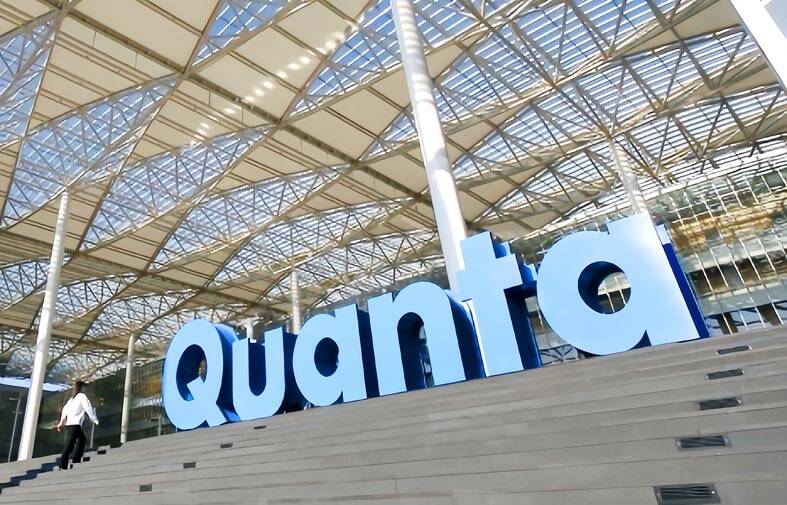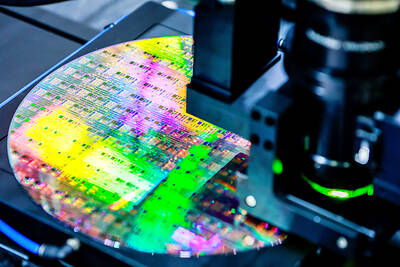A new convertible bond offering by a major supplier to Apple Inc is to add to the US dollar funds raised by Taiwanese tech firms this year, thanks to the hybrid securities’ popularity and demand for artificial intelligence (AI) investments.
Quanta Computer Inc (廣達), a MacBook contract manufacturer, is seeking to raise up to US$1 billion by selling convertible notes, it said in a filing on Friday last week.
The company said it would use the proceeds to buy raw materials.

Photo courtesy of Quanta Computer Inc
“We see the AI theme to be a fundamental change to the business mix and capital expenditure needs for the Taiwanese companies, which will set the trend for Taiwan’s equity capital markets over the next few years,” said Brian Chau, cohead of Asia equity-linked deals at UBS Group AG.
Global enthusiasm about AI is driving expansion plans by chipmakers and tech firms, many of which are based in Asia, leading to increased borrowing needs. Some are turning to convertible bonds given the high interest rates environment, as the hybrid notes’ equity component typically means coupons are lower than on regular debt.
Taiwanese companies have sold US$1.3 billion of US dollar-denominated convertible bonds so far this year, already surpassing the annual total raised in each of the past two years, Bloomberg-compiled data showed.
They also have issued a combined US$2.9 billion of additional shares in the US currency this year, exceeding any full-year figure since 2007.
The buyers of the recent share sales include sovereign wealth funds and long-only funds that seek exposure to AI, but historically have not invested in such firms, said Rob Chan, head of equity-linked origination for Asia Pacific at Citigroup Inc.
Taiwanese tech firms have been big beneficiaries of the AI frenzy. Chip giant Taiwan Semiconductor Manufacturing Co’s (台積電) US-listed shares have jumped 66 percent this year, while Quanta’s Taipei-listed stock is up about 20 percent.
The surge in US dollar funding by local firms also reflects their need to hedge against a weaker New Taiwan dollar. The NT dollar has dropped about 5 percent against the greenback this year, the second worst-performer in Asia behind the South Korean won.
While the recent pullback in AI-related stocks around the world might slow fundraising in the near term, additional share sales by Taiwanese companies are likely on tap for the next 12 to 18 months, Chau said.
Taiwanese tech companies that also have raised funds this year include computer storage devices maker Wiwynn Corp (緯穎), as well as semiconductor-related firms GlobalWafers Co (環球晶圓) and Alchip Technologies Ltd (世芯).
“There is a real use case for cash, given the growth of these businesses — it’s not about companies looking to take advantage of high stock prices,” Chan said. “I don’t think that a bit of market volatility is going to shut off the way that companies plan for accessing the markets to fund growth.”

TECH TITAN: Pandemic-era demand for semiconductors turbocharged the nation’s GDP per capita to surpass South Korea’s, but it still remains half that of Singapore Taiwan is set to surpass South Korea this year in terms of wealth for the first time in more than two decades, marking a shift in Asia’s economic ranks made possible by the ascent of Taiwan Semiconductor Manufacturing Co (TSMC, 台積電). According to the latest forecasts released on Thursday by the central bank, Taiwan’s GDP is expected to expand 4.55 percent this year, a further upward revision from the 4.45 percent estimate made by the statistics bureau last month. The growth trajectory puts Taiwan on track to exceed South Korea’s GDP per capita — a key measure of living standards — a

Samsung Electronics Co shares jumped 4.47 percent yesterday after reports it has won approval from Nvidia Corp for the use of advanced high-bandwidth memory (HBM) chips, which marks a breakthrough for the South Korean technology leader. The stock closed at 83,500 won in Seoul, the highest since July 31 last year. Yesterday’s gain comes after local media, including the Korea Economic Daily, reported that Samsung’s 12-layer HBM3E product recently passed Nvidia’s qualification tests. That clears the components for use in the artificial intelligence (AI) accelerators essential to the training of AI models from ChatGPT to DeepSeek (深度求索), and finally allows Samsung

Taiwan has imposed restrictions on the export of chips to South Africa over national security concerns, taking the unusual step of using its dominance of chip markets to pressure a country that is closely allied with China. Taiwan requires preapproval for the bulk of chips sold to the African nation, the International Trade Administration said in a statement. The decision emerged after Pretoria tried to downgrade Taipei’s representative office and force its move to Johannesburg from Pretoria, the Ministry of Foreign Affairs has said. The move reflects Taiwan’s economic clout and a growing frustration with getting sidelined by Beijing in the diplomatic community. Taiwan

READY TO HELP: Should TSMC require assistance, the government would fully cooperate in helping to speed up the establishment of the Chiayi plant, an official said Taiwan Semiconductor Manufacturing Co (TSMC, 台積電) yesterday said its investment plans in Taiwan are “unchanged” amid speculation that the chipmaker might have suspended construction work on its second chip packaging plant in Chiayi County and plans to move equipment arranged for the plant to the US. The Chinese-language Economic Daily News reported earlier yesterday that TSMC had halted the construction of the chip packaging plant, which was scheduled to be completed next year and begin mass production in 2028. TSMC did not directly address whether construction of the plant had halted, but said its investment plans in Taiwan remain “unchanged.” The chipmaker started